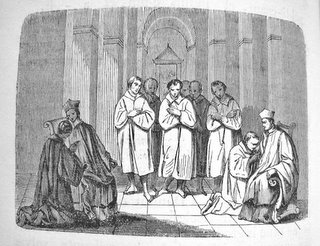Shrove Tuesday traditions
 The day before the start of Lent is renown for revelry and indulgence. Known variously as Carnival, or Mardi Gras, the day(s) of excess anticipate the rigours of the Lenten fast. Apparently there is a long tradition for this; Philip Crispin notes in this week's Tablet that there was an air of folly and gentle mockery of Church leaders in the run-up to Lent, as a means to "let off steam" and to bring "the proud and pious down to earth." Moreover the etymology of both these Continental terms suggest a feast in anticipation of the forty-day fast. 'Mardi Gras' comes from the French 'Fat Tuesday' and Carnival is said to derive from 'carne vale': farewell to flesh, meaning of course not just meat but other carnal pleasures!
The day before the start of Lent is renown for revelry and indulgence. Known variously as Carnival, or Mardi Gras, the day(s) of excess anticipate the rigours of the Lenten fast. Apparently there is a long tradition for this; Philip Crispin notes in this week's Tablet that there was an air of folly and gentle mockery of Church leaders in the run-up to Lent, as a means to "let off steam" and to bring "the proud and pious down to earth." Moreover the etymology of both these Continental terms suggest a feast in anticipation of the forty-day fast. 'Mardi Gras' comes from the French 'Fat Tuesday' and Carnival is said to derive from 'carne vale': farewell to flesh, meaning of course not just meat but other carnal pleasures!Joanna Bogle also writes about Shrovetide in her book, A Book of Feasts and Seasons, and she explains that in the days when the Lenten fast was more strictly observed all meat, eggs and cream had to be eaten up before the fast began on Ash Wednesday. As such, in Britain, the Monday before Ash Wednesday is still known in some areas as 'Collop Monday'; Collops being bits of meat, which were consumed on that day. Until not very long ago, the merry-making associated with Collop Monday included the recitation of verses written as part of a farewell gesture to hilarity, rich food and wine until the end of Lent. As such, it is also known as 'Poets' Day' and the scholars of Eton used to compose valedictory verses to be recited on Collop Monday.
However, today is more popularly known as 'Pancake Day' even if the significance may be lost on many who do not keep the fast. I recall pancakes being served every year on this day when I was in Halls in University; similarly fish was always served on a Friday. Pancakes of course, have plenty of eggs, cream and milk as their main ingredient and later today, the Prior of Cambridge, Fr Richard Conrad, OP will make us some of his famous and delicious pancakes with a hint of lemon and orange. As a special treat, we shall also eat them with some maple syrup which was sent to us from the USA by a friend recently.

In some English villages, a pancake race (shown on left) is held as an event for mothers. Every woman taking part must wear a headscarf and an apron. She must bring along a frying pan with a half-cooked pancake in it. They then line up along a starting line, and set off when a bell is sounded. Before reaching the end-point of the race, each mother must toss the pancake three times (in honour of the Trinity). Failure to do so disqualifies the contestant. The winner is the first to reach the end with the pancake successfully tossed and still in the pan!
On a more sombre note, today is also called Shrove Tuesday, from the Middle English word, "shriven" meaning to receive absolution for sins. This of course is a reference to the Sacrament of Penance and in pre-Reformation England, a bell would beckon the people to church on Shrove Tuesday in order that they might confess their sins and thus be prepared to embark on the trials of the Lenten fast in a state of grace. Incidentally, the Church retains this practice by enjoining all Catholics (who are conscious of having committed a mortal sin) to receive the Sacrament of Reconciliation at least once a year, particularly in this period before Easter. In parts of England, the church bells still ring out on this day but they are called the 'Pancake Bell'.
Of course, as our reflections on the last two days have noted, such feasting does not make sense without a fast and indeed, vice versa. The one presupposes the other. As such, the practice of eating pancakes on this day, the secular revelries of Mardi Gras and Carnival from Sydney to Rio de Janeiro to New Orleans, all make little sense if it is not followed by an authentic fast. Otherwise, it just become yet another meaningless ritual and an excuse for excess and (in some cases) wanton debauchery!
By all means, let us enjoy our pancakes and let off steam on this day but let us also remember that this feasting and revelry anticipates the great Lenten fast and ought to lead to our being shriven; to receive absolution for our sins in the beautiful Sacrament of Reconciliation is perhaps the greatest cause for laughter and rejoicing and indeed the best preparation for the great Paschal Feast.
Oh... and just because we still can, let's all shout to the Lord with joy singing: ALLELUIA!!
The illustration above shows penitents being absolved ('shriven') and is taken from an 1845 edition of the Pontificale Romanum.







2 Comments:
I was involved in a pancake race once, In South Carolina, believe it or not!
Great fun!!
These are the British pancakes, which are more like crepes, correct?
'Cause American pancakes are made with flour and water, no eggs or milk included....
Post a Comment
<< Home